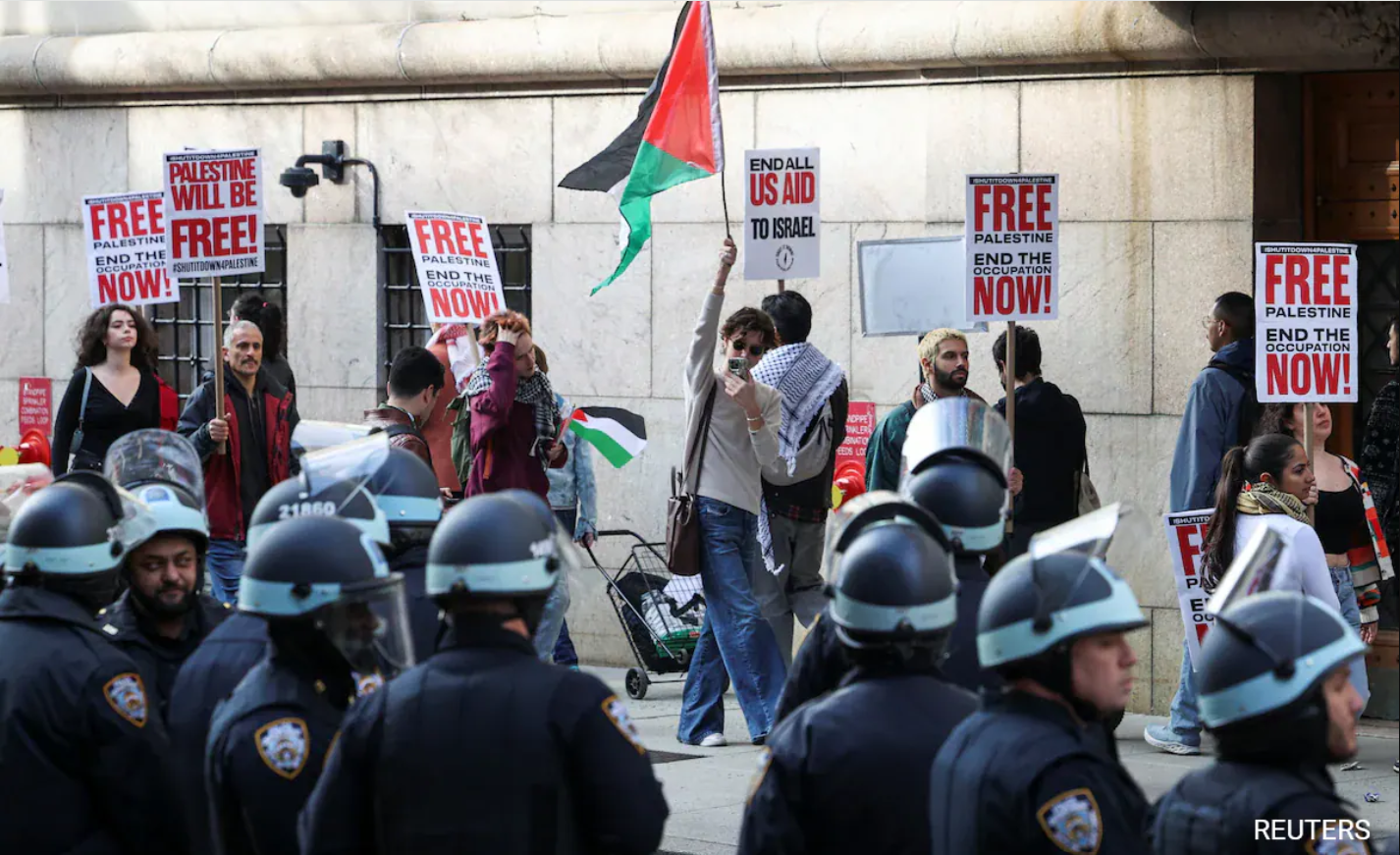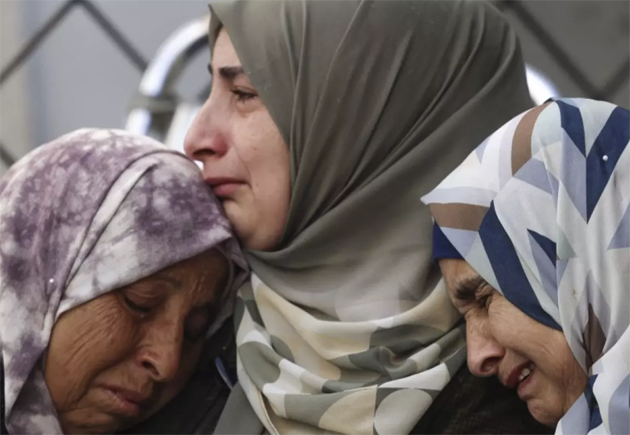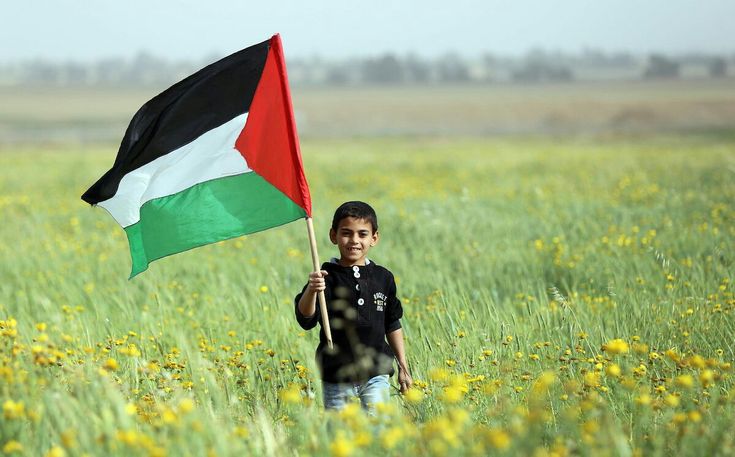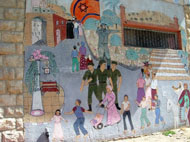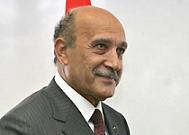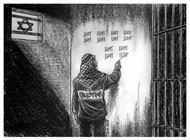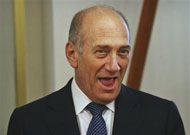On March 7, while thousands of Jewish mourners attended the funeral processions of the eight people killed in Jerusalem, the perpetrator’s house was draped in the yellow and green flags of Hizbollah and Hamas in memory of his death.
The assailant, revealed as east Jerusalem resident ‘Ala Abu Dheim, walked into the Merkaz Harav yeshiva in the west Jerusalem district of Kiryat Moshe at 20:30 on March 6 wielding a Kalashnikov, six clips and a pistol. What followed was the largest attack on Israeli territory since a suicide bomber killed 11 people in Tel Aviv on April 17, 2006 and the most severe targeting of Israelis in Jerusalem since a suicide bomber killed eight people on February 22, 2004.
‘Ala Abu Dheim, however, was not a suicide bomber nor did he attempt to protect his identity or comply with the image of an assassin by donning a balaclava, but simply disguised himself as a yeshiva student. The 25 year old openly walked into the seminary through the library and started shooting at a room full of 80 students while they were making preparations for celebrating the new month in the Jewish calendar, in which the holiday Purim falls.
The gunman killed eight of the seminary’s students aged 15 to 26, injuring nine others in the process before an Israeli officer sealed the fate of the attacker by shooting him twice in the head as he attempted to flee the scene.
The event was quickly condemned by a multitude of leaders around the world with the UN, EU, Britain and France all voicing the heinous nature of the crime and negative effect it could have on the peace process. US President George Bush declared the act a “barbaric and vicious attack” while Israeli representatives called the incident an “abominable” massacre. In addition, Palestinian President Mahmoud Abbas denounced the killings of any innocent civilians, be it Israelis or Palestinians.
The motive for such an attack is easily ascertained. Although Abu Dheim’s reaction to the political situation should not be pardoned, it must be investigated and placed into context. Israeli Foreign Minister Tzipi Livni commented that there could be “no cause that could justify this action”. However, ‘Ala Abu Dheim’s was a Palestinian living in the Jabal al-Mukaber area in southeast Jerusalem and would have been surrounded by Israeli settlement expansions in an area Palestinians hold as the future capital of an independent Palestinian state. Furthermore, he had told his sister Iman that he “wasn’t able to sleep because of the grief” he felt for the two week Israeli incursion into Gaza which killed 129 Palestinians. Disgruntled and discontented with Israel’s treatment of Palestinians, the incentive and pretext were set.
One major deterrent to Palestinians who aim to retaliate against Israel is the latter’s meticulous attention to security. Palestinians in Gaza are in an enclosed prison while in the West Bank, they have restricted movement and limited access to places due to checkpoints and the Separation Wall which act as omnipresent obstacles to any operation’s success. Abu Dheim did not have this problem. As a Palestinian resident of Jerusalem with a blue Israeli ID, he had the freedom to venture to any part of Jerusalem at will.
With all the venues at Abu Dheim’s disposal, why did he choose the Merkaz Harav yeshiva? One reason could be familiarity. Abu Dheim’s neighbors claim that he worked as the seminary’s driver, although this fact has been disputed by the seminary which asserts that they do not hire Arabs. This would not be surprising taking into account the nature of the targeted institution – its ethos and function coincidently act as a convincing explanation into why it was selected.
The Merkaz Harav yeshiva is labeled as a perfect example of the Religious Zionist Movement in Israel. The prestigious center of studies which boasts 1000 students [many of whom are armed], was founded by Rabbi Abraham Isaac Kook and is a member of the Gush Emunim movement, a group which strongly advocates Israeli settlers taking up land in the West Bank [or what Jews perceive as their holy lands of Judaea and Samaria]. According to Ali Abunimah, co-founder of the Electronic Intifada, it is in Hebron where Gush Emunim members write “Arabs to the gas chambers” on Palestinian houses. The center even reveres individuals like Baruch Goldstein who entered the Ibrahimi mosque in 1994 and shot dead 29 Palestinians while they were praying at the holy site in Hebron.
This beacon of Zionism and its extremist values is bound to find opposition with its Palestinian Arab neighbors on account of its strong beliefs and teachings. After Abu Dheim had been killed, members of the seminary stood outside shouting “Death to Arabs”.
As always with these attacks, the persistent question of responsibility must always be addressed so that the incident can be blamed on one specific party. However, as Abu Dheim managed to infiltrate a Jewish center of worship in Jerusalem and kill a number of Jewish students, there were invariably a number of groups claiming this breech of Israeli security in order to boost their credibility. The responsibility debate was swift to ensue.
First of all, Ahrar al-Jalil [Galilee Freedom Battalion] took credit for the attack. The group consisting of Palestinian-Israelis who sympathize with Hizbollah leader Hassan Nasrallah, are rather unknown, linked previously to the 2003 killing of an Israeli soldier and the kidnapping of an Israeli girl. Ahrar al-Jalil stated that the operation was researched for 10 days and executed by their group with the help of a Hamas member. They also stated that a third party was involved but could not mention them for “security” reasons.
Later, Hizbollah-run Al Manar news station reported that a new group called “the Martyrs of Imad Mughniyeh” organized the attack. Imad Mughniyeh was a General of Special Operations for Hizbollah, and was killed in a car bomb last month. Hizbollah leader Hassan Nasrallah proclaimed that Israel was to blame. However, the group has not yet affirmed that they assisted in any way with this operation.
It would be surprising for such an audacious attack on Israeli territory to be attributed to these unfamiliar groups. For this reason, people were listening intently for what Hamas would say.
On March 7 a Hamas official claimed that the group was responsible. People in Gaza took to the streets in celebration and various Hamas officials “blessed” the “heroic” attack, but prominent Hamas figure Ismail Radwan reported that the political wing of Hamas could not verify involvement without a statement made by al-Qassam Brigades [the military wing]. When approached, the military wing emphasized that the attack was a “natural reaction to the immensity of the barbaric Zionist Nazi crimes which have targeted women, children, mosques and houses…in the Gaza Strip and West Bank”.
If responsible, why would Hamas not publicly announce it? Maybe it is a policy of the movement? It took Hamas two days to admit to the suicide bomb in Dimona but in this instance it has been a long time without a response. Alternatively, Hamas may be victims of their own fame and truly not be the ones to blame although the assailant’s family are said to have strong ties with Hamas. Hamas may be responsible and fear large scale retaliation in Gaza or a cessation of ceasefire talks but Hamas knows they will constantly be targeted in Gaza and are realistic about the bleak possibility of a ceasefire.
Maybe Hamas still does not know themselves. It is clear that the party responsible was Abu Dheim himself – he was ostensibly not linked to a specific group and could have acted on his own [his attack was personally executed in an unconventional manner]. Abu Dheim may have simply needed someone to provide the weapon [Kalashnikovs are virtually impossible to acquire in Jerusalem and even if Abu Dheim did, it would have cost him around $3,000-3,500 – a lot of money for a young man in east Jerusalem]. This scenario would make it very difficult to decipher which party was responsible both for those inquiring as well as the group apparently involved. It is possible that Abu Dheim made the decision himself and was approached, through family contacts, either by a willing contributor, Hizbollah, Hamas or both. After all, Hamas politburo chief Khaled Me’shaal [in exile in Syria] and Hizbollah’s Hassan Nasrallah are financed by the same benefactors – Syria and Iran. It is not inconceivable that they deliberate with each other. This operation would serve a double purpose and almost absolve them of claiming complete responsibility. It would be a response to the death of Imad Mughniyeh and/or to the assault on Gaza, in both instances proving that the two groups are able to strike Israel whenever, wherever they wish.
With the responsibility issue still somewhat ambiguous, what ramifications will Abu Dheim’s response to the plight facing Palestinians have? A reprisal is expected from sections of the Israeli public and history has proven that Israel will not abstain from one.
First of all there are the immediate measures implemented by an increasingly anxious Israel. An assault in Jerusalem has sent a strong message to Israel that their security is not impenetrable and can be breeched, even in the heart of west Jerusalem. However, frustratingly for Israel, the responsible party has yet to be revealed, which may delay Israel from taking instinctive retaliation. For now, following the attack, Israel has been reduced to applying the standard procedures. Israel forbade any individual under 45 from entering the al-Aqsa compound in Jerusalem and dignified the notion that Hizbollah was involved by flying warplanes over Beirut to deliver the message to the Lebanese Shiite group of what they could be expecting.
Secondly, Abu Dheim has created a moral crisis within the UN Security Council centered around how Israeli attacks on Gaza can be compared to individual strikes by Palestinians on Israel. Libya, soon after the incident, blocked a motion in the Security Council in reference to this topic claiming that the resolutions passed must be “balanced” rather than condemn Palestinian rocket attacks and individual operations over Israel’s regular invasions and assaults on Gaza.
Abu Dheim’s action has also sent reverberations of concern with respect to the peace process. Israeli Prime Minister Ehud Olmert has reiterated that peace talks will continue with President Abbas but has undermined the process by confirming that Israel has allowed over 750 building permits for expansion in the Givat Ze’ev settlement in the West Bank, a violation of stage one of their roadmap obligations and a move which has led the Palestinian negotiating team to further doubt Israel’s seriousness to reach an agreement for peace by the end of 2008. Settlers have threatened to erect one new illegal outpost for every victim of the Jerusalem yeshiva so this may have been a way for Olmert to acquiesce to this demand. Further still, Egypt, with the support of the US, EU and PA, is attempting to broker a ceasefire between Hamas and Islamic Jihad with Israel. If any of these Palestinian factions are deemed responsible for aiding Abu Dheim’s operation, this potential ceasefire will not be successful.
The other, not as noticeable but equally damaging is the psychological effect this attack has on both sides, planting both the internal and external seed of division. The actions of Abu Dheim in Jerusalem could further deepen the gulf of difference between the moderate Palestinians, vying for peace, and those who believe that Palestinians should continue to resist. The worry for Israel is that Abu Dheim’s actions may inspire any of the 250,000 Arabs in east Jerusalem, with unlimited access, to act similarly. Meanwhile, on the Israeli side, Public Security Minister Avi Dichter has stressed that Israel should find a “legitimate” way of expelling Arabs from east Jerusalem who aim to carry out such attacks. In addition the Israeli public is gradually losing patience with their government. At the funeral of the victims, Rabbi Ya’akov Shapira in his eulogy stressed the need for a “good leadership, a stronger leadership, a more believing leadership”. One must ask the question, if Israelis lose faith in Olmert’s coalition and vote for Benjamin Netanyahu as his replacement, will the attacks on Israeli territory not escalate with the arrival of a right wing Likud nationalist?





